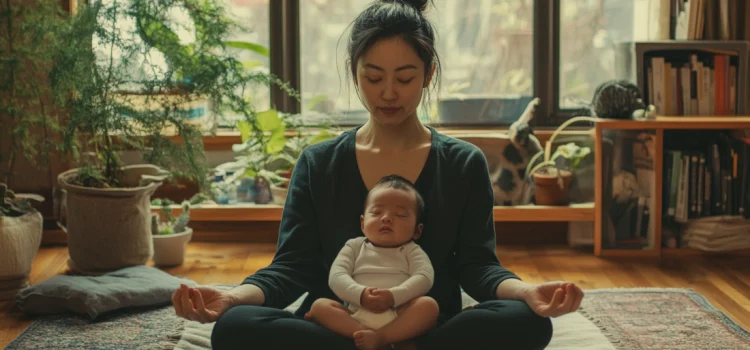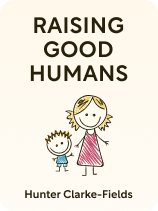

This article is an excerpt from the Shortform book guide to "Raising Good Humans" by Hunter Clark-Fields. Shortform has the world's best summaries and analyses of books you should be reading.
Like this article? Sign up for a free trial here.
How helpful is meditation for parents? What’s the RAIN meditation?
Hunter Clarke-Fields says that developing a mindfulness practice and increasing your self-awareness can help minimize your stress and emotional outbursts. However, she emphasizes that difficult emotions are natural—for parents and children—and you shouldn’t feel any shame for having them.
Continue reading to learn how meditation can change your life as a parent.
Accept That Difficult Emotions Are a Part of Life
The problem is that, too often, we lack the tools to deal with these difficult feelings in a healthy way. Most people tend to either suppress their emotions entirely and ignore them, or they become overwhelmed by them. This is why meditation for parents is essential.
(Shortform note: Desmond Tutu and the Dalai Lama, in The Book of Joy, argue that embracing emotions like sadness and anger fosters compassion and self-understanding. They stress that suffering is universal. This perspective helps cultivate a sense of shared humanity, making it easier to manage difficult feelings constructively. By recognizing that these emotions are common to all, we can approach them with curiosity rather than fear, learning from them without letting them define us. Accepting hard emotions as natural allows for growth and deeper connections with others.)
Clarke-Fields offers an approach: mindful acceptance. This “middle path” involves neither pushing away nor becoming consumed by difficult emotions. Instead, it means taking time to acknowledge and fully experience the physical sensations that arise with your feelings, then allowing them to pass naturally.
(Shortform note: While Clarke-Fields uses the term “middle path” to describe finding the balance between two extremes, the Middle Path, or Middle Way, is a fundamental concept in Buddhism that avoids the extremes of self-indulgence and self-mortification. It’s the path that the Buddha, Siddhartha Gautama, discovered and taught after his enlightenment as the way to achieve Nirvana, or liberation from the cycle of birth, death, and rebirth (samsara).)
Clarke-Fields suggests the RAIN meditation as a step-by-step approach for handling intense feelings in these moments:
- Recognize the strong emotion you’re experiencing and describe it using language that separates you from what you’re feeling. For example, “I am feeling scared” rather than “I am scared.”
- Allow yourself to feel whatever you’re feeling. Avoid judgment or trying to move past the feeling too quickly.
- Investigate the feeling. Be curious. Notice where the feeling shows up in your body. What thoughts accompany the feeling? Are those thoughts accurate or helpful?
- Nurture the feeling. Ask yourself what you need. For example, if you are feeling scared, the scared part of you may need reassurance that you are safe. You could put your hand over your heart and speak kind words to yourself like “This feeling of fear is temporary. I am safe right now.”
(Shortform note: The RAIN meditation was developed by Michele McDonald, a mindfulness teacher with deep roots in Insight Meditation. This mindfulness practice has gained popularity for its straightforward and effective approach to handling emotional difficulties. Tara Brach, a psychologist and meditation teacher well-versed in Buddhist meditation practices, also played a significant role in popularizing the technique. Brach embraced RAIN and contributed to its widespread adoption by integrating it into her teachings and sharing it with a broader audience. Today, RAIN is widely used within various mindfulness communities for personal growth and emotional healing.)
Clarke-Fields emphasizes that using this approach to manage difficult emotions takes practice, but the more you do it, the less control your feelings will have over your life and your decision-making. As your ability to self-regulate and your self-awareness increase, it’ll become easier to make intentional decisions that strengthen your relationship with your child.
(Shortform note: Clarke-Fields echoes a core principle that Charles Duhigg explores in The Power of Habit: the transformative power of repeated actions. Duhigg illustrates how habits are formed through a loop of cue, routine, and reward. Applying this to mindfulness practice, you might use feelings of stress or anxiety as a cue to begin a specific calming routine such as deep breathing exercises or meditation. The reward comes in the form of immediate relief from distress and, over time, an increased ability to manage emotions effectively. This habit loop not only helps in regulating your emotional state but also improves overall mental health.)

———End of Preview———
Like what you just read? Read the rest of the world's best book summary and analysis of Hunter Clark-Fields's "Raising Good Humans" at Shortform.
Here's what you'll find in our full Raising Good Humans summary:
- How to use mindfulness to manage emotions—both yours and your child's
- Four steps to resolving conflicts with your child
- Practical strategies for creating a simple, low-stress environment at home






